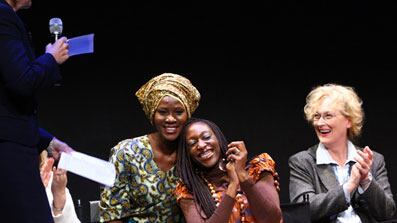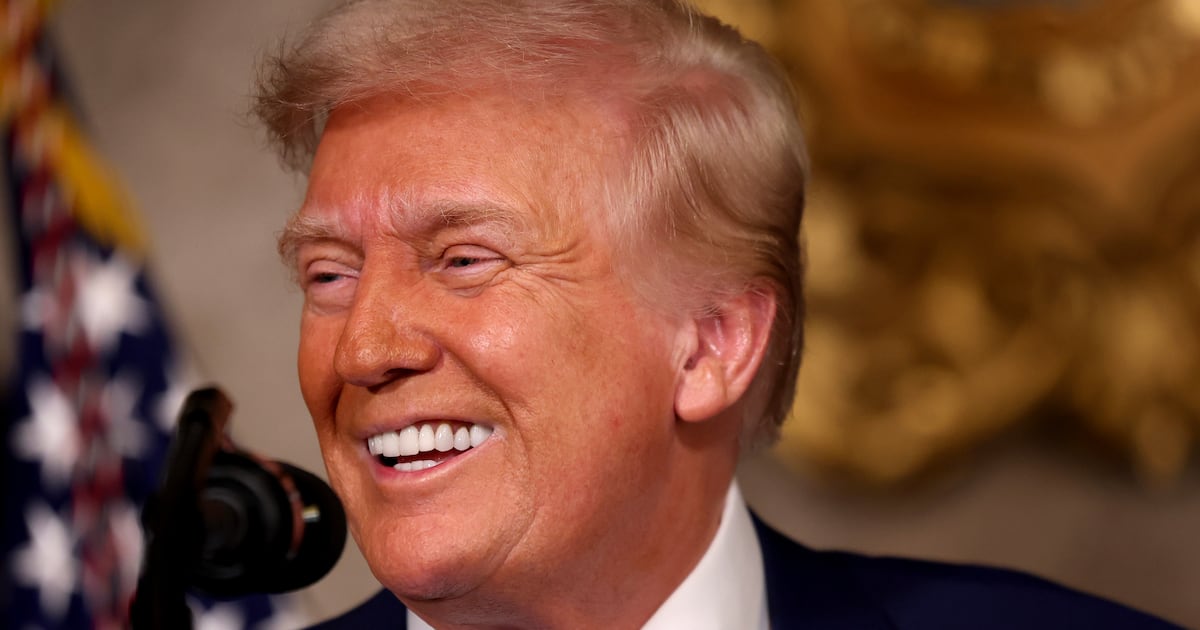Plus: • Take action! Find out how to help with our solutions Cheat Sheet. • Watch 11 incredible moments from the summit. • Click here for The Daily Beast’s full coverage of Women in the World • Read the weekend's agenda. • Stay engaged to Women in the World on Twitter and Facebook
A Senegalese activist recounts how two of her three daughters died after botched circumcision. A Chinese author describes her devastation when she discovered she was pregnant with a daughter instead of a son. And an Indian activist tells harrowing tales of rescuing young girls from sex slavery.
Those were some of the riveting stories shared on stage this weekend at The Daily Beast's emotional and power-packed Women in the World summit, which brought together more than 300 activists and women leaders from all over the world to fight sex trafficking, child marriage, and rape as a weapon of war.
Click Image to View Our Gallery of Highlights from Women in the World

The weekend kicked off Friday night when Secretary of State Hillary Clinton introduced a reading of the play SEVEN, performed by Meryl Streep, among other stars, which tells the stories of seven women activists working for social justice around the world. It was followed by two days of intense and inspiring discussions by panelists including Queen Rania of Jordan, White House senior adviser Valerie Jarrett, and dozens of activists whose stories brought tears, occasional laughter—and a new call to action to the crowd gathered at the Hudson Theatre in New York.
At a panel moderated by Diane Sawyer on Saturday, Senegalese activist Marietou Diarra recounted, through sobs, how two of her three daughters died due to complications from female circumcisions in early childhood; Diarra went on to become an activist against the ritual, working with the nonprofit Tostan to eradicate female genital-cutting in over 100 Senegalese villages. Speaking with Katie Couric, Kakenya Ntaiya, the founder of a network of girls’ schools in her native Kenya, told the stunned crowd that she had agreed to undergo female genital-cutting in exchange for her father allowing her to complete high school instead of getting married.
Earlier in the day, bestselling Chinese novelist Anchee Min ( Red Azalea) had summit attendees riveted with her hilarious, poignant, and adventure-packed tale of immigrating to the United States after eight years in a Communist labor camp. Though Min’s writing is known for its strong female characters, she admitted that after a lifetime of seeing her grandmother’s struggle with her bound and broken feet, she was terrified to bring a daughter into the world. During her first pregnancy she had taken medicines that were supposed to guarantee a male child, and had refused to believe two sonogram results showing her fetus was female.
“Who wants to be a girl in China?” Min asked the crowd. Indeed, one of the unintended consequences of the country’s one-child rule has been sex-selective abortion and a birth rate of 120 boys for every 100 girls.
From French Finance Minister Christine Lagarde on the "Happiness Report"—a new, more socially conscious way to measure a nation’s GDP—to Cherie Blair on the importance of getting mobile phones into the hands of every developing-world woman, the solutions floated by speakers at Women in the World were consistently surprising. Liberian activist Leymah Gbowee suggested Michelle Obama host a conference of African first ladies to call attention to the epidemic of rape in war zones. Afghan child-welfare advocate Suraya Pakzad asked Americans to lobby Congress to fund the construction of a new women’s shelter in each of Afghanistan’s 34 provinces—there are less than 10 shelters in the entire country, where 90 percent of women have experienced a human-rights abuse and most marriages are arranged, sometimes between grown men and girls as young as 10 years old. Indian anti-trafficking activist Sunitha Krishnan asked that employers hire trafficking survivors, giving them a chance to overcome stigma and reenter society.
On the summit’s final day, Lesley Stahl of 60 Minutes led a freewheeling discussion with White House senior adviser Valerie Jarrett, who said she believed Congress would pass health-care reform within a week. That was just one of the weekend’s formidable on-stage pairings; Barbara Walters interviewed Madeleine Albright and Katie Couric chatted with Jordan’s Queen Rania al-Abdullah, an advocate for girls in the developing world.
At the reading of the play SEVEN, the crowd was hushed as Iranian star Shohreh Aghdashloo ( The House of Sand and Fog) began the performance in a burqa, depicting an Afghan woman who used the garment to help smuggle children to safety. Meryl Streep played Irish labor activist Inez McCormack and Archie Panjabi ( The Good Wife) portrayed Pakistan’s Mukhtar Mai, who survived an elder-sanctioned gang “honor” rape to become an international advocate for girls’ education and women’s rights.
At an elegant dinner Saturday evening at the United Nations, fashion designer and philanthropist Diane von Furstenberg, a summit co-host, presented the first annual DVF Awards of $50,000 to four women working to improve women's rights around the world, from sex trafficking in the United States to women's education in Afghanistan.
Olivia Cole writes for the Spectator and the London Evening Standard. An award-winning poet, her first collection, Restricted View, was published this fall.






